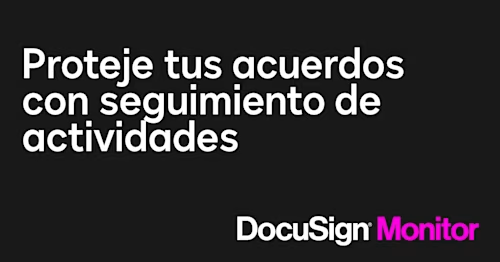
Detecta, investiga y responde a amenazas potenciales con Docusign Monitor
Docusign Monitor ayuda a proteger tus acuerdos con monitoreo constante de actividades

Evitar daños contra actividad no autorizada es un reto crítico para las empresas. Un estudio llevado a cabo en el 2020 por Ponemon Institute reveló que el 7% de las vulneraciones fueron causadas por actividad de personas no autorizadas, mientras que otro 19% fue causada por robo de información. Sin embargo, la actividad no tiene que ser maliciosa para causar daños: el mismo estudio atribuyó el 23% de todas las vulneraciones a errores humanos, incluyendo acciones negligentes por parte de empleados o contratistas.
Manejar riesgos por actividades no autorizadas es de gran importancia entre las grandes empresas a medida que transforman sus procesos contractuales. Después de todo, aunque Docusign cubra o exceda los estrictos estándares de seguridad de EU, la UE y todo el mundo, el sistema contractual de una empresa estará tan seguro como lo sea su integridad operativa y gestión de información. Es por eso que no resulta sorprendente que algunos de los principales clientes de Docusign hayan pedido mayor visibilidad de estos factores, para ayudarles a resolver amenazas que pueden surgir de actividad no autorizada.
Presentamos Docusign Monitor
Docusign Monitor ayuda a proteger tus acuerdos con monitoreo constante de actividades. Brinda visibilidad casi en tiempo real de tus operaciones y cómo se relacionan con tus acuerdos y procesos Docusign. Mediante el uso de análisis avanzado para monitorear la actividad de cuentas Docusign en la web, dispositivos móviles y API en toda tu empresa, Monitor ayuda a los equipos de seguridad a:
Detectar amenazas potenciales
Investigar incidentes
Responder de forma decisiva
Detecta amenazas potenciales con alertas normativas
Monitor permite que emerjan diferentes tipos de eventos relacionados con la actividad de tu cuenta—como intento de inicio de sesión, cambios a contraseñas y borrado de sobres—para identificar amenazas internas o externas. Viene integrado con alertas predeterminadas para tipos comunes de actividad sospechosa, como cuando un usuario borra demasiados sobres en un periodo corto, o cuando un administrador delegado elimina una solicitud de autentificación de signatario.
Investiga incidentes con información ejecutable
Monitor brinda fácil acceso a información detallada sobre las actividades que detonaron la alerta, incluyendo dirección IP, ubicación y tipo de dispositivo. Cuando están equipados con esta información ejecutable, los departamentos de seguridad pueden priorizar e investigar incidentes para determinar si realmente existe una amenaza.
Responde a amenazas con acciones decisivas
Monitor permite a los equipos hacer frente a amenazas rápidamente con las medidas adecuadas, como cerrar una cuenta en peligro antes de que pueda ocasionar daño significativo. Remediar amenazas a tiempo es una gran forma de contener daños relacionados con actividad no autorizada, razón por la cual los equipos de seguridad continúan adoptando herramientas de interpretación de actividades y automatización de seguridad.
Conecta Monitor a tu paquete de seguridad existente
Monitor también incluye Monitor API que puede emitir información sobre actividad directamente desde tu paquete de seguridad existente, integrándose fácilmente con el software que ya usas, incluyendo herramientas Security Information and Event Management (SIEM) como Splunk o Sumo Logic, y herramientas de visualización de datos como Tableau o Power BI. Esto da a tu equipo la flexibilidad de personalizar tableros y alertas para cubrir requisitos específicos según tu industria, de seguridad y normativos.
A medida que continúan creciendo tus casos de uso en Docusign, Monitor puede ser una herramienta útil para impulsar la integridad de tus sistemas, reforzar las políticas de la empresa y asegurar a tus clientes que sus datos más delicados están en buenas manos.
Conoce cómo Docusign Monitor puede ayudarte a proteger tus acuerdos.
Visita la página web de Docusign Monitor o contacta a ventas para ver una demostración.
Publicaciones relacionadas
Docusign IAM: la plataforma de acuerdos que tu negocio necesita




